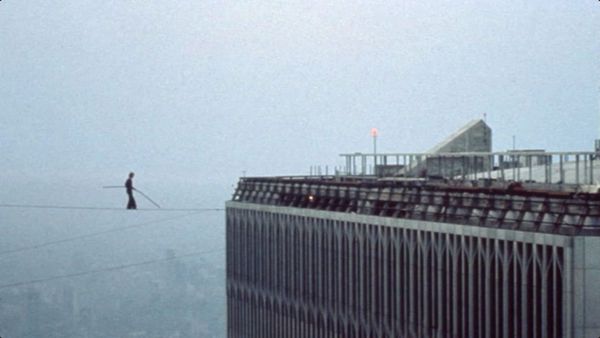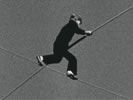Eye For Film >> Movies >> Man On Wire (2008) Film Review
Man On Wire
Reviewed by: Tony Sullivan

This BBC Storyville documentary concerns the activities of Philippe Petit - magician, pick-pocket and wire walker - and his ambition to practice his art on a wire strung between New York City's World Trade Center's twin towers.
This little gem has a narrative structure that Hollywood movies seem to have forgotten how to employ - all the ingredients for a classic thriller are here.

We start with one man and his obsession. For Philippe Petit it seems the World Trade Center towers were built but for one purpose only - to provide him with a challenge to his skills.
The caper takes six years worth of development and planning and waiting for the right moment, waiting for the structure of the towers to near completion. A team is assembled, trusted friends, a lover, all of whom may literally have the life of our master planner hanging in the balance. With flashbacks and candid interviews these people become flesh and blood in a way that the cast of Ocean's Eleven could only dream of.
As with all covert operations, our heroes spend time casing the joint. Plans are obtained, photographs taken, and at one point they even pose as journalists to tour the buildings. Ultimately they must smuggle in the necessary equipment under the very noses of security.
Philippe Petit is a thoroughly engaging naughty schoolboy, who flouts authority and the rules at every turn, and the beauty is that no damage is done – other than to the nerves.
The action is accompanied by a score mostly culled from Michael Nyman's back catalogue, from the likes of A Zed And Two Noughts and The Draughtsman's Contract, the onscreen action is a perfect match for the fussy, obsessive-compulsive nature of Nyman's music, each track greeted like an old friend.
Footage of talking heads is integrated with Petit's own home movies and astonishing recreations so good as to make one think the director must have had access to a time machine.
No mention is made of the fate of the structures in question - it is not necessary - and yet the film still manages to become a strangely fitting memorial, like looking at treasured old photographs of those no longer with us.
Director James Marsh quietly exploits the perils of the situation without rubbing your face in them. The film elicited a couple of audible gasps from the audience at Sundance - possibly due to induced vertigo or, perhaps, from the sheer insane beauty of it all.
At the heart of it all, an ode to the free spirit, a courageous if quite possibly mad individual and the strange beauty of buildings that now represent something entirely different. A well-deserved prizewinner at Sundance this year.
Reviewed on: 11 May 2008
















